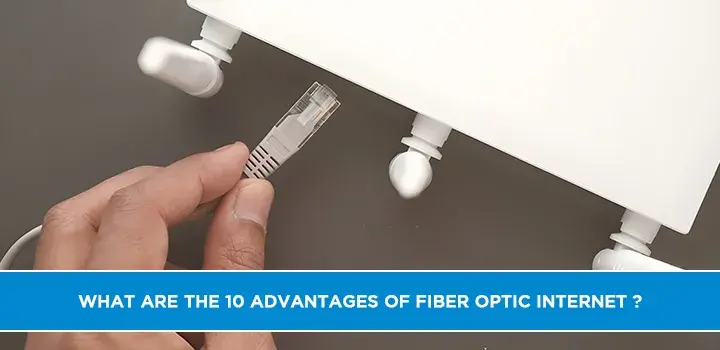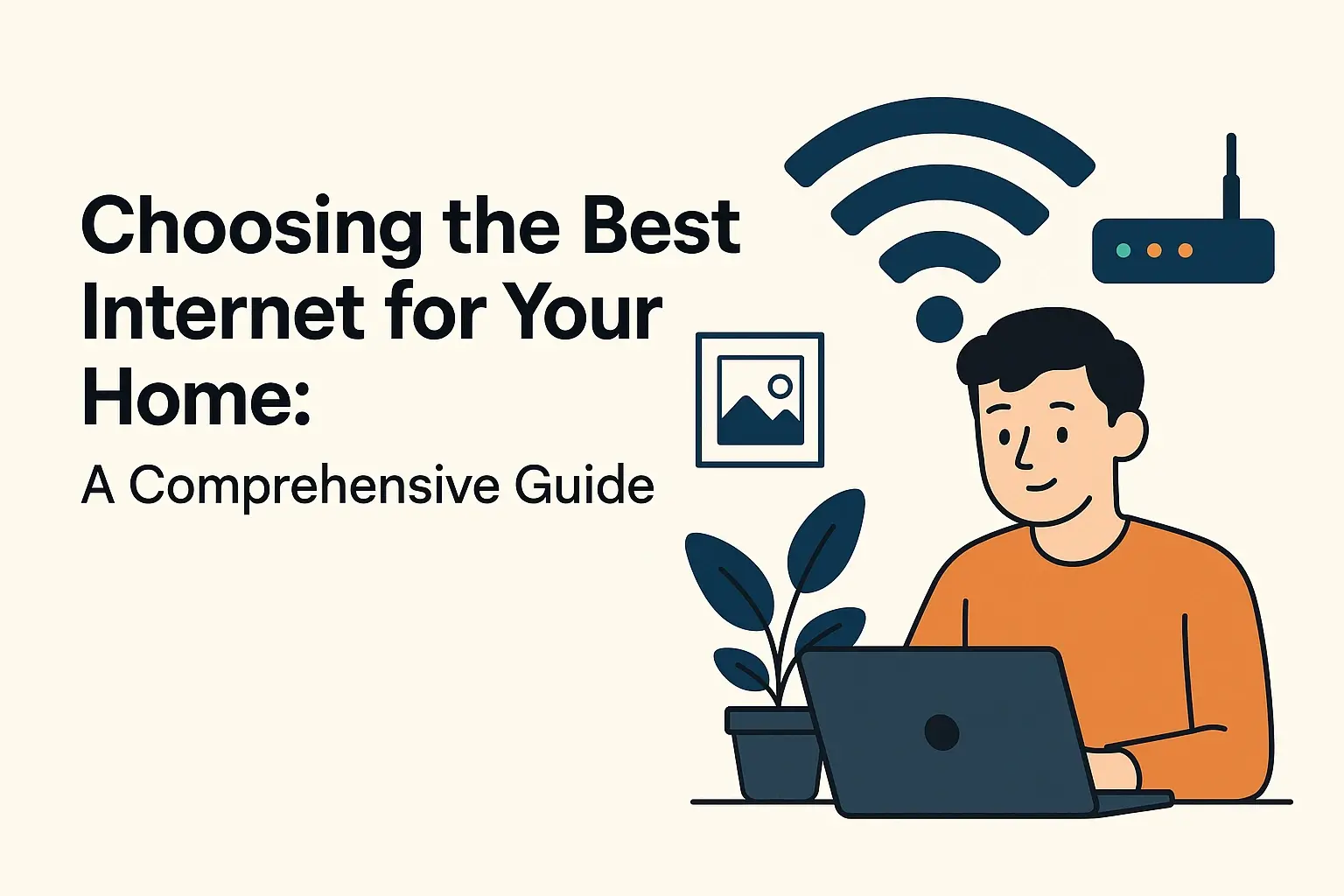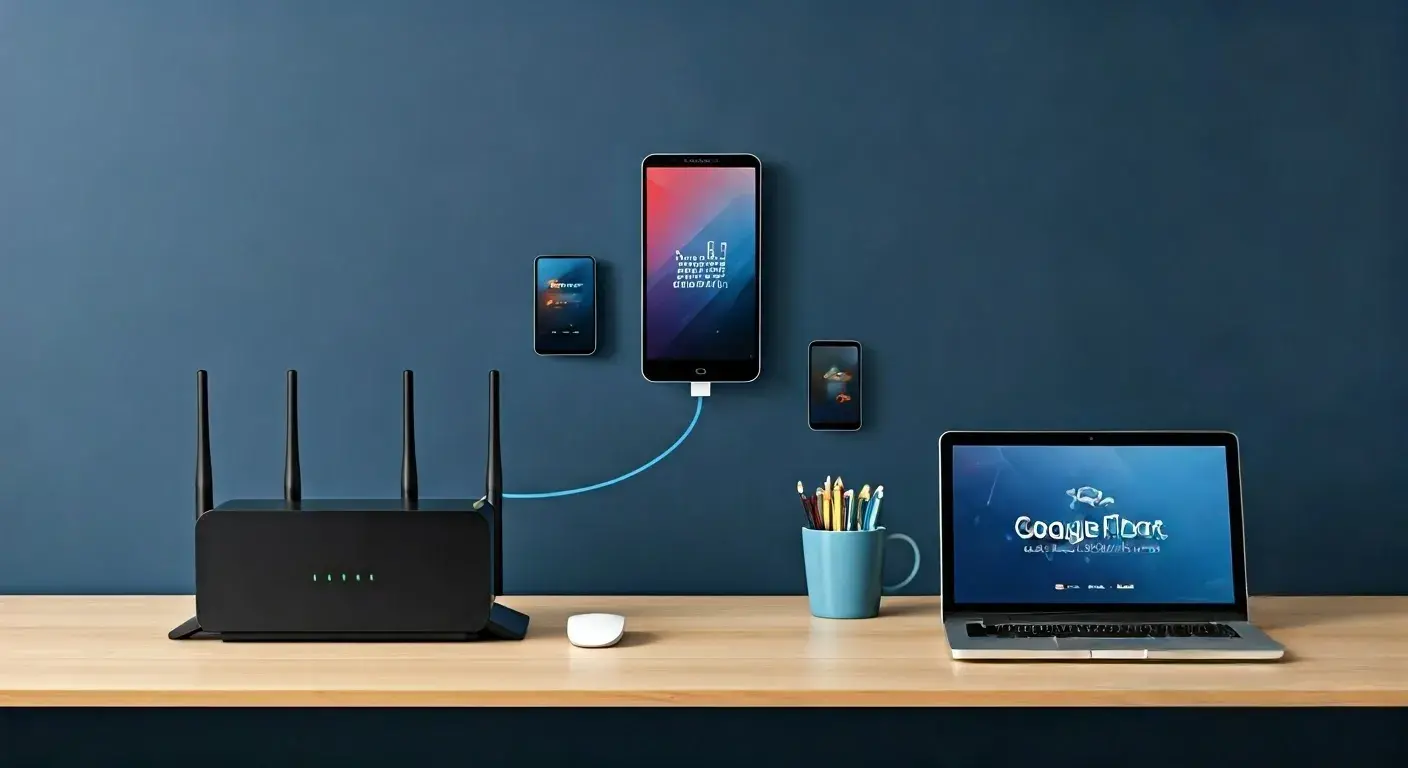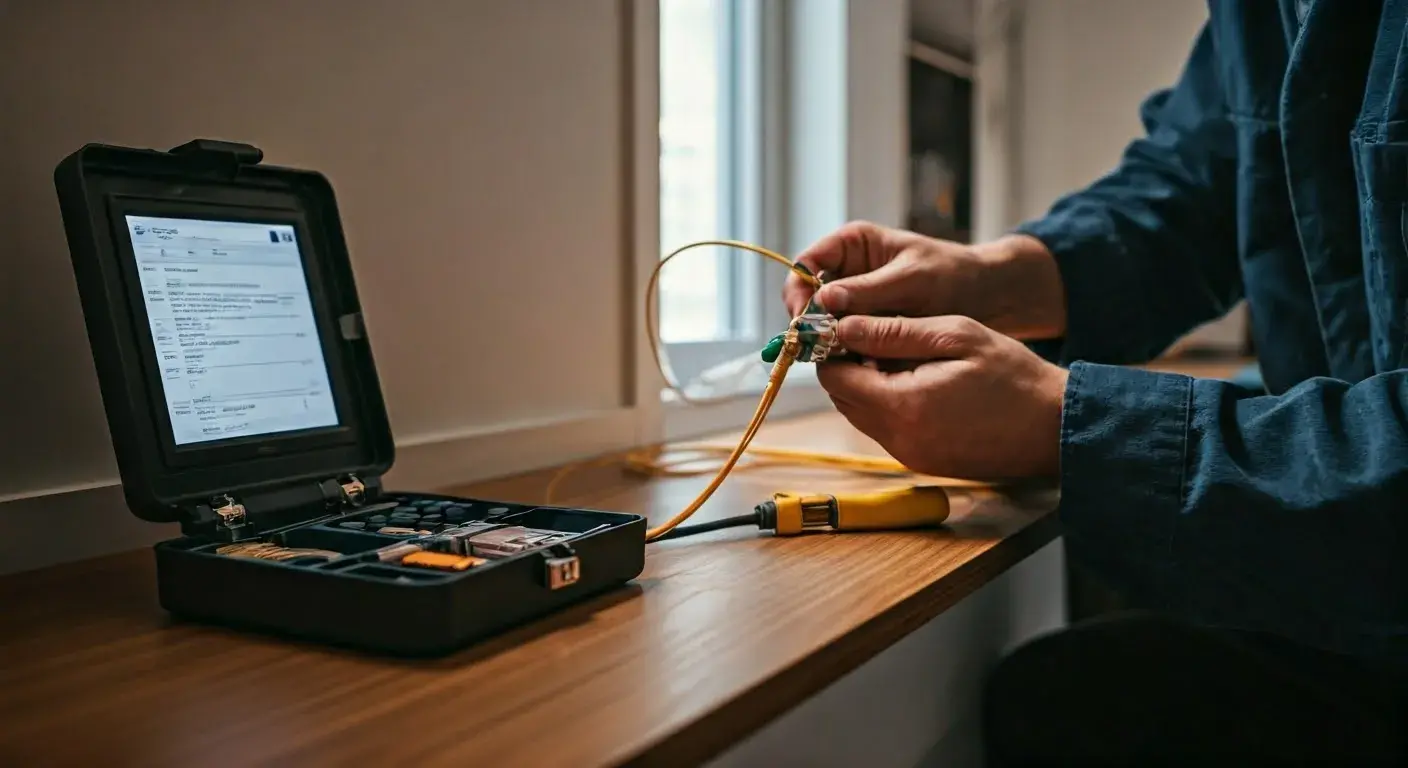What are the 10 Advantages of Fiber Optic Internet?

Fiber optic internet connections offer a number of advantages over traditional copper wire connections. Fiber optic cables are made of extremely thin strands of glass or other transparent material, which can transmit data at much higher rates than copper wires. Fiber optic cables are also much thinner and lighter than copper wires, making them easier to install and less likely to be damaged. In addition, fiber optic cables are not affected by electromagnetic interference, which can degrade the quality of copper wire connections. Fiber optic internet connections also tend to be more reliable than copper wire connections, and they can provide higher speeds and capacities. As a result, fiber optic internet connections are becoming increasingly popular for both homes and businesses.
Time to cut the cable.
Until now our best home-internet option was the love-it-and-hate-it cable connection most of us know. It’s fast - sometimes. But like a highway at rush hour, it gets jammed during peak traffic hours. It simply can’t keep pace with our mushrooming internet needs. Let’s dig into the facts around fiber optic cable internet’s top 10 advantages vs DSL and cable.
What is fiber optic internet?
Fiber optic internet is a type of broadband internet that uses fiber optic cables instead of traditional copper cables. Fiber optic cables are made of very thin strands of glass or plastic, and they are used to transmit data at high speeds. Fiber optic internet is much faster than traditional broadband internet, and it is also more reliable. Fiber optic internet is also less expensive than other types of broadband internet, making it a good choice for many people. Fiber optic internet can be used for both home and business applications, and it is becoming more popular as more people learn about the benefits of this type of internet service.
How fiber optic internet works
Fiber optic internet works by splitting files like movies and games into data packets of zeroes and ones. A laser flashes this morse code-type signal into one end of a plastic or glass filament. The “wire” is about as thick as one strand of human hair.
A special sheath called a cladding keeps the beam of light inside the filament. It bounces off the walls for as far as 60 miles and pops out the other end where a modem decodes the light into a form your computer can use.
3 types of fiber optic cable internet
Fiber optic cable internet is a type of high-speed internet that uses fiber optic cables to transmit data. There are three types of fiber optic cable internet: traditional fiber optic cable, hybrid fiber optic cable, and fiber to the home (ftth).
Traditional fiber optic cable is the most common type of fiber optic cable internet. It uses fiber optic cables to transmit data between the internet service provider (isp) and your home.
Hybrid fiber optic cable is a type of fiber optic cable that uses both fiber optic cables and radio waves to transmit data. This type of cable is more expensive than traditional fiber optic cable, but it is faster and more reliable.
Fiber to the home (ftth) is a type of fiber optic cable that uses fiber optic cables to transmit data to your home. Ftth is more expensive than traditional fiber optic cable, but it is faster and more reliable.
Top 10 advantages of fiber optic internet
Is fiber optic internet service better? In a word, yes. It’s much faster and more reliable than cable internet or DSL. But it has other major advantages like no throttling and better tv picture quality. Let’s take a quick stroll through the 10 ways fiber optic cable internet beats standard cable.
1. Speed
The fiber optic internet speed is 1 Gbps. That’s 10 to 20 times speedier than the 50 to 100 Mbps cable most of us know now. For a concrete fiber optic vs cable internet speed comparison, see the list below. It shows how long it takes to download a 2-hour movie on fiber optic vs cable internet.
Time to download a 2-hour HD movie:
Fiber optic internet speed 1 Gbps: 40 seconds
Cable internet speed 100 Mbps: 7 minutes
Dsl speed 25 Mbps: 30 minutes [3]
4g LTE speed 35 Mbps: 25 minutes
5g internet speed 10 Gbps: 4 seconds
2. Reliability
Fiber-optic internet is becoming increasingly popular due to its many advantages over traditional copper-based internet. Fiber optics are much thinner and lighter than copper cables, making them easier to install and less disruptive to construction projects. Fiber optic internet also has a much higher bandwidth than copper, meaning that it can handle more data at a faster speed. In addition, fiber optics are not susceptible to interference from electrical sources, which can often cause signal problems with copper-based internet. As a result, fiber-optic internet is more reliable and efficient than its copper-based counterpart, making it the preferred choice for businesses and homes alike.
3. No throttling
Fiber optic internet is becoming increasingly popular due to its many benefits. Fiber optics use thinner and more flexible glass strands to transmit data, which results in a higher-quality signal with less interference. Fiber optic cables are also not susceptible to electromagnetic interference, making them ideal for use in high-speed data networks. In addition, fiber optic internet is not subject to throttling, which can often be a problem with other types of internet service. Throttling is when your internet service provider deliberately slows down your connection speed in order to conserve bandwidth or improve network performance. This can be extremely frustrating, especially if you are trying to stream video or download large files. However, because fiber optic internet is not subject to throttling, you can enjoy a consistently fast and reliable connection.
4. Same speed for download and upload
Fiber optic internet provides some of the fastest and most reliable connections available today. One of the main advantages of fiber optic internet is that it offers symmetrical speeds, meaning that both the download and upload speeds are the same. This is in contrast to most other types of internet connection, which tend to offer much higher download speeds than upload speeds. For example, a typical cable internet connection might offer download speeds of 50 Mbps and upload speeds of 10 Mbps. Fiber optic internet is ideal for users who need to regularly transfer large amounts of data, such as video editors or developers working with large files. It can also be beneficial for users who want to take advantage of cloud storage services since uploading data to the cloud can be just as important as downloading it. Fiber optic internet is still relatively new, but it is quickly becoming the gold standard for high-speed internet access.
5. Higher-quality tv
As anyone who has ever streamed a movie or tv show knows, the quality of your internet connection can make all the difference. Fiber optic internet is the quickest and most reliable option available, and it's becoming more and more common as a result. Fiber optics use thin strands of glass to carry data, which means that they're able to transmit large amounts of information very quickly. This makes fiber optic internet perfect for streaming HD video content. In addition, fiber optic internet is much less likely to be affected by weather conditions like rain or snow, so you can always count on a consistent connection. If you're looking for the best possible streaming experience, fiber optic internet is the way to go.
6. Better gameplay
Fiber optic internet is the newest and best way to get online. Fiber optics use tiny glass or plastic threads to send information. They are much faster than cable and DSL internet. Fiber optic internet is less likely to have weather-related problems. Fiber optics also offer symmetrical speeds, meaning you can upload as quickly as you can download. This is important for activities like video conferencing, online gaming, and cloud storage. Fiber optic internet is also more secure than other types of the internet because it is harder to tap into the fiber optic cables. If you are looking for the best possible gaming experience, you need fiber optic internet. Fiber optics provide a fast, reliable connection that will give you an edge over your competition.
7. Healthier
Fiber optic internet is much healthier than other types of internet because it uses light instead of electricity to transmit data. This means that there are no harmful electromagnetic fields (EMFs) emitted from fiber optic cables. In addition, fiber optic internet is much faster than other types of internet, so you don't have to worry about your connection being too slow. Fiber optic internet is also more reliable than other types of internet, so you can be sure that you'll always have a strong signal. Overall, fiber optic internet is the best choice for your health and for your home.
8. Connecting with multiple devices
Fiber optic internet is one of the most efficient ways to connect multiple devices to the internet. Fiber optic cables are much thinner than traditional copper cables, and they can carry data at much higher speeds. This means that you can connect more devices to the internet without experiencing any slowdown. Fiber optic internet is also very reliable, so you can be confident that your connection will stay up even if one of your devices fails. Fiber optic cables are also less susceptible to interference, so you'll get a clearer signal regardless of where you are in your home. If you're looking for the best way to connect multiple devices to the internet, fiber optic is the way to go.
9. Safety
Fiber optic internet is one of the safest and most secure ways to connect to the internet. Fiber uses light instead of electricity to transmit data, which means that it is immune to electromagnetic interference. This makes fiber optic internet much less susceptible to hacking and tampering than other types of internet connections. In addition, fiber optic cables are much harder to physically tap into than copper wires, making fiber optic internet one of the most secure ways to surf the web. So if you're looking for a safe and reliable way to connect to the internet, fiber optic internet is the way to go.
10. Telemedicine
Fiber optic internet connection is becoming increasingly popular in the medical sector due to its reliability and high speed. This type of internet connection is critical for businesses that need to transmit large amounts of data, such as medical images or patient records. Fiber optic internet also has the advantage of being more secure than other types of internet connection, making it ideal for businesses that handle sensitive information. In addition, fiber optic internet is less likely to be affected by weather conditions, so it can provide a consistently high level of service. For these reasons, fiber optic internet is an ideal solution for businesses in the medical sector that need a reliable and high-speed internet connection.
Disadvantages of fiber optic internet
There are a few disadvantages to fiber optic internet that should be considered before making the decision to switch to this type of internet service. First, fiber optic internet is not always the most affordable option. Second, it can be difficult to get a good connection in some areas. Third, fiber optic internet is not always available in all areas. Fourth, fiber optic internet can be slower than other types of internet service. Finally, fiber optic internet can be more difficult to set up than other types of internet service.
What’s the downside of fiber optic internet service? There are a few.
1 reach
Fiber optic internet connectivity is the new standard for speed and reliability. Fiber optics uses light to transmit data at high speeds, making it the ideal choice for businesses that rely on fast, reliable internet access.
2. Slow growth rates
Another drawback is slow growth rates. The push to install fiber optic cable internet to the rest of the country has slowed, thanks to the advent of 5g wireless internet. 5g will give us speeds 10 times faster than fiber optics - without wires. The major carriers are in a race to roll out 5g. Most have pulled back their ambitious fiber plans or abandoned them.
3. High prices
Fiber optic internet prices are often very high, depending on the city or region you are in. In some cases, the prices can be much higher than the traditional internet service providers.
How to find fiber optic internet providers near you
While fiber optic internet is not available in all areas, there are a few ways you can go about finding providers near you. One option is to check with your local telephone or cable company. Many of these companies offer fiber optic services in select areas.
Call on (855) 210-8883 to book your fiber optic internet.





